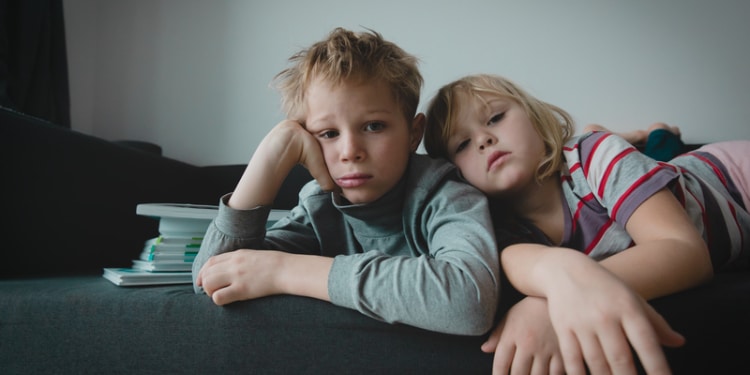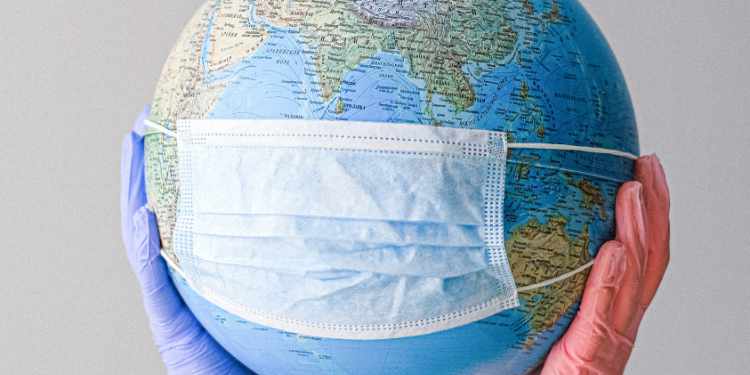










The current coronavirus pandemic has complicated a plethora of physical and mental aspects of our wellbeing. Individuals are forced to socially distance themselves from friends and family in an effort to contain the pandemic while others who have the illness suffer through the sickness isolated or even spend the final moments of their life alone.

Although doctors, nurses, and hospital staff are well-trained to respond to sick individuals and grieving family members, it can take much more to find a sense of peace and comfort during these unprecedented times. Keep reading to discover ways of handling loneliness as you cope with the illness or support loved ones with it, as well as how to manage grieving in isolation when someone you love dies from the virus.
Symptoms of the coronavirus can vary greatly. Some people may show no symptoms or simply have a cough, while others have excruciating muscle pains, difficulty breathing, or worse. Those with extreme symptoms usually go to the hospital and are treated professionally by doctors and nurses.
Although the isolation and loneliness are extraordinary for these patients, there is some socialization for them because they are regularly being treated by medical experts. They are not completely handling the sickness on their own. For those in this situation, regular video chats or FaceTime calls from family and friends can be comforting and reassuring.
If someone you know is in the hospital with coronavirus, be sure to check up on them regularly through phone calls, texts, and emails so they feel loved and supported during this difficult time. Because they cannot have any visitors during their stay at the hospital, it is more important than ever to let them know you are thinking about them.
For those sick with the coronavirus at home, the loneliness can feel much greater. Due to the infectious nature of the virus, it is imperative that anyone sick with the illness stay completely isolated in an effort to contain the spread. The overwhelming fear and anxieties that come from a novel virus that is still being researched heavily, can be intense. Those with the virus may feel a stigma such as shame, fear, and embarrassment from contracting it.
Whether you or someone you love is isolated due to the coronavirus remind yourself to say connected, even when apart. Make a special effort to stay social using the help of technology. Let family and friends know how you are doing via regular phones calls and video chats. Remember, you do not always have to have the topic of conversation be about the illness. Avoid the news. Try to keep things as normal as possible by talking about everything from current events to hobbies and other areas of interest. Socialization in various ways is key, especially if you are feeling lonely or depressed. Feeling connected to loved ones will help ward off stress and feelings of seclusion.
People are currently experiencing all types of grief caused by the COVID-19 pandemic. Grief is a normal reaction to a job loss catalyzed by companies downsizing and laying off workers as well as the drastic change to daily life and routines. Unfortunately, with so many people dying of the coronavirus, it is also a common and natural response to a loss of death of a loved one. Symptoms of grief include distress, anxiety, denial, disbelief, shock, sadness, anger, loss of appetite, change in sleep behaviors, and more. Everyone reacts to grief differently.
Some individuals may experience multiple losses such as a several family members and friends dying as well as a job loss and a drastic disruption to daily life. Because the coronavirus is so contagious, individuals might not be able to be with their loved ones in the final moments of their life. They also may not be able to mourn someone’s death in the company of their family and friends. As the coronavirus continues, these losses can occur at any time and simultaneously, which can prolong grief and complicate a person’s ability to heal.
There is no right or wrong way to experience grief. Social distancing has changed the way people can gather and grieve. With a limited number of people allowed to gather in-person, traditional funeral services and church services cannot be held. While it may be difficult to mourn in this way, know that it is vital in the prevention to slow the spread of this deadly virus.
To cope with your feelings as you suffer the loss of a loved one, be sure to connect with family and friends by inviting them to online conference meetings. This is a great time to virtually come together and share memories and stories about the loved one. For those who are spiritual or religious, a video conference could also be a great time to recite a poem, spiritual reading, or hymn among a group.
Avoid long periods without connecting with friends or family members. Be sure to check in every day for both your mental health and others. Connecting even through a quick phone call or text can help you cope with grief without feeling extremely isolated.
If you find that grief is interfering with your ability to live a normal life and are becoming depressed or experiencing feelings of overwhelming sadness, it is time to seek professional help. Tackling the symptoms of grief alone can be extremely difficult but you can connect with a professional therapist from the safety and convenience of your own home.